Stay in the know on all smart updates of your favorite topics.
Summerschool 'Wie maakt de slimme stad leuk?'
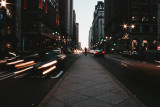
Het wordt druk, heel druk in Zuid-Holland. Meer woningen, meer mensen in de stad, meer auto’s op de weg – hoe houden we het leuk in de steden van Zuid-Holland? Dat ga jij oplossen tijdens de summerschool ‘Wie maakt de slimme stad leuk?’ op 23, 24 en 25 augustus 2021 in Zuid-Holland. We onderzoeken in 3 dagen hoe we steden slimmer, mooier en leuker kunnen maken.
Waar gaat het over?
De provincie Zuid-Holland staat voor een grote opgave. Het aantal inwoners stijgt de komende decennia met tien tot vijftien procent. Dat betekent meer woningen, meer mensen op straat, meer fietsers, langere files, drukker openbaar vervoer, vollere parken, etc. En dat terwijl juist elke vrije vierkante meter wordt volgebouwd. In de dichtstbevolkte provincie van ons land moet je op een slimme manier omgaan met de ruimte die je wél hebt.
De vraag is hoe digitalisering en technologisering bijdraagt aan het leefbaar houden van de stad. Daar wordt volop mee geëxperimenteerd in het Living Lab Scheveningen. Met 763 sensoren, robots die afval oprapen en geluidscamera’s die overlast kunnen voorspellen, is hier de slimme stad in de werking. Maar wat kan er nog meer? Wat is de next-level smart city?
Dat ga jij onderzoeken tijdens deze summerschool. Drie dagen lang ga je samen met je team aan de slag met de vraag:
💡 Hoe kunnen technologische en/of digitale oplossingen bijdragen aan een positieve beleving van de openbare ruimte, waardoor verdichtende steden prettig en leefbaar blijven?
In multidisciplinaire teams ga jij een concept bedenken en uitwerken die antwoord geeft op deze vraag. Het antwoord moet zo concreet mogelijk zijn en haalbaar, schaalbaar en deelbaar. En we gaan natuurlijk op bezoek bij Living Lab Scheveningen om met eigen ogen te zien hoe slimme toepassingen kunnen bijdragen aan de leefbaarheid van de stad.
Voor wie?
Je bent geschikt als je begrijpt dat er voor ingewikkelde problemen geen eenvoudige antwoorden volstaan. En soms ook wel. Je hebt een achtergrond in:
- URBANISME: ruimtelijke ordening, planologie, stedenbouw
- SOCIAAL: sociologie, sociale geografie
- DESIGN: product design, multimedia, marketing
- TECH: geo en media design, game design, computer science / IT en software developing
- of iets anders interessants, want verder out-of-the-box is ook welkom.
Wij zijn blij met omdenkers en dwarskijkers. Je studeert of bent net aan het werk, je hebt een hbo of wo-opleiding en bent niet ouder dan 27 jaar. Aan deze summerschool kunnen 24 jongprofessionals deelnemen. Deelnemen is gratis.
Dit levert het jou op
TECHS:
Maak technische oplossingen die maatschappelijke impact hebben
En leer van de technische experts over nieuwe techtoepassingen
URBANISTEN:
Leer over de nieuwe ruimtelijke ordening
En over smart cities en de impact van digitalisering in de stad
En er is meer:
Werk aan concrete oplossingen
Ontwikkel je professionele en persoonlijke skills;
Ontmoet een netwerk van bedrijven en organisaties om je carrière een kick-start te geven;
En je hebt drie dagen plezier met leuke mensen van allerlei vakgebieden;
Maak kans op 2000 euro met je team (500 euro per persoon)!
Meld je nu aan
Meld je nu aan voor de summerschool ‘Wie maakt de slimme stad leuk?’ op 23, 24 en 25 augustus 2021 in Zuid-Holland. Kijk voor meer informatie op de website.
Het Kennislab voor Urbanisme organiseert deze summerschool in opdracht van de Provincie Zuid-Holland en in samenwerking met Living Lab Scheveningen, gemeente Den Haag en Future City Foundation.
Demoday: Circular & Digital innovations
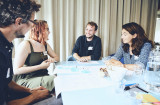
In our program of Tuesday July 6th Circular will meet Digital. Demodays are part of our innovation process and intended to boost the progress of the various innovation projects. Always in a variety of ways and in a very positive and open vibe. Invitations are sent but we're always open to adding a few new names to the list.
We host these days every 8-10 weeks. During Demodays, community members pitch projects & ask for input, and in small groups we work on concrete questions that our partners put on the table.
Pitches to explore:
• Can we unify powerful, complex tech with a democratic society? – KNVI
• Subsidy opportunities for innovation partners – City of Amsterdam
• Building bridges that stimulate bike use – Pontiflex
• How to take circularity and energy into account when it comes to data storage – A’dam Economic Board
Workshops:
Circular ICT - AMS Institute & Gemeente Amsterdam
De production, purchase and use of ICT equipment happens mostly in a well known linear model. But what if we could let the end user manage their hardware in a circular way? Together we'll identify what’s needed to come up with the ideal monitor for sustainable ICT.
Materials Passport – Provincie Noord-Holland
A materials passport could truly speed up circular construction. It gives insights on what’s deconstructed when demolition is taking place and reused in new designs. The different experiences with the Cruquiusbrug and the Bruggencampus Flevoland-Floriade will serve as examples to pinpoint challenges and opportunities.
Responsible IT en data – Hogeschool van Amsterdam
Building a responsible IT System isn’t done overnight. There’re equipment choices, energy use, privacy and security. Not all aspects get the same attention which has consequences for the transparency and accessibility. We'll work with the question: How can you truly built a responsible IT system?
Have a question? Let’s hear it in the comments!
City Deal “Smart City, This is How You Do It” Connects to International Best Practices
How can we learn from international smart city experiences to ensure that we do not keep reinventing the smart city wheel. In the City Deal “A Smart City, This Is How You Do It” 58 public and private parties are working together to collect, validate and scale smart city solutions in the Netherlands.
On 10 June, Future City Foundation (FCF) and Amsterdam Smart City (ASC) brought together more than 30 Dutch and international colleagues to connect the City Deal to international experiences and best practices. The session consisted of short pitches sharing the tools and solutions developed in the City Deal Working Groups. For every pitch the international experts were asked to share their experience with similar projects, and reflect on what is needed to improve and scale the solutions abroad.
1. Open Urban Data Platform Tender
As more municipalities look to purchase urban data platforms, can we develop a generalized Program of Requirements? The Dutch cities of Rotterdam, Hilversum, and Helmond are working to develop such a flexible Program of Requirements, taking into account aspects such as scalability, flexibility and shareability of data, as well as privacy, cybersecurity, and data autonomy. During the session, the city of Aahus shared the experience of Open Data DK, a collaboration of Danish municipalities and regions to not only tender, but collectively develop an open data portal, leading to improved collaboration and cost savings for Danish municipalities and their stakeholders.
2. Model ByLaw Smart City in Public Space:
The public space is rapidly digitalization with many parties wishing to add sensors, beacons, cameras and other objects to enable various smart city applications. Local authorities need to find effective ways to regulate how this is done, so that the public space does not become a “Wild West” of smart applications. Within the City Deal, a model bylaw has been drawn and it is now being tested in Rotterdam. The question to the group was whether similar bylaws or initiatives been developed in other cities or jurisdictions? The city of Vienna shared its experience developing a Smart City Framework Strategy – a high level but binding document when it comes to designing bylaws related to various smart city domains.
3. Citizen Measurement Initiatives:
Within the City Deal three Working Groups are exploring how to use citizen measurement to create smart, sustainable, and inclusive cities, and how to link these initiatives to policy. On this topic the group could learn from initiative like iScape and WeCount in Dublin’s Smart Docklands District, which focus on engaging citizens in measurement projects, and linking the results to city policy. And when it comes to engaging citizens in measuring their environment, city of Dublin had another suggestions for the Dutch colleagues: leverage the existing network of public libraries to engage and involve citizens and policy makers in citizen-measurement projects.
Second International Roundtable Planned
The discussion revealed there are a lot of shared challenges, for instance in scaling smart city projects, so it's necessary that we keep sharing approaches and lessons learned internationally. Following the success of this first international roundtable, we are planning a second session on September 30. Dutch and international experts who would like to participate, can send an email to Cornelia Dinca via cornelia@amsterdamsmartcity.com with a short explanation of how like to contribute to the session. For more information or any other questions about the City Deal please contact Wendolijn Beukers via wendolijn@future-city.nl.
Thank You to the Participants
ASC and FCF would like to thank all the Dutch and international colleagues who contributed their expertise during the session.
City Deal Working Groups Members
· Noor van den Brink, Policy Advisor, Ministry of Infrastructure and Water Management
· Marcel Broekhaar, Smart City Program Management, City of Zwolle
· Arjan Hof, CTO, WeCity
· Daniel de Klein, Business Development Manager Digital City, City of Helmond
· Anita Nijboer, Partner, Kennedy Van de Laan
· Shahid Talib, Directeur Smart City, Heijmans
· Simone Rodenburg, Advisor CIO Office, City of Enschede
· Henri de Ruiter, Environmental Advisor, RIVM National Institute for Public Health and the Environment
· Jeroen Steenbakkers, Owner, Agaleo
International Peers
· Ulrich Ahle, CEO, FIWARE Foundation
· Jamie Cudden, Smart City Program Manager, City of Dublin
· Bo Fristed, CIO, City of Aahus
· Gianluca Galletto, Managing Director, Global Futures Group
· Lea Hemetsberger, Director Projects & Network, Open & Agile Smart Cities (OASC)
· Jong-Sung Hwang, Masterplanner Busan Smart City, South Korea
· Nigel Jacob, Co-Founder New Urban Mechanics, City of Boston
· Gabriella Gomez-Mont, Former Director of Laboratorio para la Ciudad, Mexico City & Founder of Experimentalista
· Jonathan Reichental, Former CIO of Palo Alto & author of Smart Cities for Dummies
· Florian Wollen, Coordinator, Urban Innovation Vienna
Duurzaam, transparant en onafhankelijk: de nieuwe datastrategie van provincie Noord-Holland
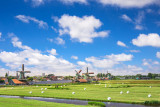
Provincie Noord-Holland heeft in mei 2021 een nieuwe datastrategie in concept vastgesteld. De wereld verandert snel en de strategie uit 2018 sloot steeds minder aan bij de huidige ambities. Het streven is om datatechnologie in te zetten voor optimale resultaten van onze maatschappelijke opgaven.
Hierbij zijn drie elementen van belang. Als eerste ‘duurzaamheid’. Wij willen profiteren van digitalisering op een manier die zo min mogelijk ten koste gaat van natuurlijke hulpbronnen. Het tweede element is ‘transparantie’. Wij zien in transparantie de kans om te innoveren mét het vertrouwen van onze inwoners. Het laatste element is ‘data-soevereiniteit’. Wij zien het als onze verantwoordelijkheid om onze onafhankelijkheid zo veel mogelijk te borgen. En misschien nog wel belangrijker: óók de onafhankelijkheid van de inwoners van Noord-Holland.
Om deze stip op de horizon te bereiken hebben we vier doelstellingen opgesteld:
Doelstelling 1
In 2023 zijn wij beter dan nu in staat om met data de maatschappelijke resultaten van onze opgaven te beschrijven, verklaren, voorspellen of optimaliseren.
Met datatechnologie dragen we bij aan de maatschappelijke resultaten die wij voor onze opgaven willen bereiken. Die resultaten verschillen per opgave. Daarom zullen wij voor elke opgave de datapositie in kaart brengen, zo kunnen we tegemoetkomen aan de specifieke behoeften. Voor een aantal complexe deelopgaven starten we bijvoorbeeld een experiment, waarbij we de mogelijkheden van een ‘digital twin’ onderzoeken.
Doelstelling 2
In 2023 zijn de digitaliseringsbelangen van onze provincie adequaat behartigd op het niveau van de Europese Unie, de Rijksoverheid, de Tweede Kamer en de regio Amsterdam.
Digitalisering en AI vertegenwoordigen een steeds groter economisch en maatschappelijk belang. Zij hebben meer en meer politiek-bestuurlijke aandacht. Zowel op het niveau van de Europese Unie, de Rijksoverheid, de Tweede Kamer als de regio Amsterdam. Dat is relevant voor onze lobby.
Doelstelling 3
In 2023 is meer data van de provincie open en toegankelijk beschikbaar en weten de inwoners van Noord-Holland waar ze deze data kunnen vinden.
Open data is voor de provincie om twee redenen van belang. Allereerst draagt het bij aan transparantie, wat essentieel is voor het vertrouwen van onze inwoners. Daarnaast stelt open data externe partijen, bijvoorbeeld startups, in staat om applicaties te ontwikkelen. Hiervoor richten wij in 2021 een open dataregister in. En hebben wij in 2023 onze meest relevante open datasets gepubliceerd.
Doelstelling 4
In 2023 ervaren inwoners, bedrijven en onze partners dat wij inzet van data en datatechnologie afwegen tegen de Tada-waarden: inclusief, zeggenschap, menselijke maat, legitiem en gecontroleerd, open en transparant, van iedereen - voor iedereen.
We werken vóór onze inwoners en bedrijven. Dus zorgen we dat ons werk met data geen negatieve gevolgen voor hen heeft. Kortom: we gaan verantwoord om met data en datatechnologie. Om dit waar te maken experimenteren we in 2021-2023 met het toepassen van de Tada-waarden en werken we toe naar het publiceren van onze algoritmen in een register. Zo innoveert de provincie Noord-Holland mét het vertrouwen van haar inwoners en bedrijven.
Note van ASC: Wil je nog net iets meer weten? Laat het weten in de comments.
Beyond the smart city: Digital innovation for the Good of citizens

About ten years ago, technology companies started to provide cities with technology, luring them with the predicate ‘smart(er)’, a registered trademark of IBM. At that time Cisco's vice-president of strategy Inder Sidhudescribed the company’s ‘smart city play’ as its biggest opportunity, a 39,5 billion dollar-market. During the years, that followed, the prospects rocketed: The consultancy firm Frost and Sullivan estimated the global smart city technology market to be worth $1.56 trillion by 2020.
The persistent policy of technology companies to suggest a tight link between technology and the wellbeing of the citizens, angers me. Every euro these companies are chasing at, is citizens’ tax money. What has been accomplished until now is disappointing, as I documented in the IET Journal. According to The Economist it is not surprising that a ‘techlash’ is underway: Many have had it with the monopolistic dominance of behemoths like Google, Amazon, Facebook and the like, because of their treatment of sensitive data, the lack of transparency and accountability of algorithm-based decision making and the huge profits they make from it.
Regaining public control
However, let's not throw out the baby with the bathwater and see how digital innovation can be harnessed for the Good of all citizens. Regaining public control demands four institutional actions at city level.
1. Practicing governance
Before even thinking about digitalization, a city must convert into best practices of governance. Governance goes beyond elections and enforcing the law. An essential characteristic is that all citizens can trust that government represents their will and protects their interests. Therefore, it is necessary to go beyond formal democratic procedures and contact stakeholders directly, enable forms of participatory budgeting and deploy deliberative polling.
Aligning views of political parties and needs and wants of citizens takes time and a lot of effort. The outcome might be a common vision on the solution of a city’s problems and the realisation of its ambitions, and a consecutive political agenda including the use of tools, digital ones included.
2. Strengthening executive governmental power
Lack of cooperation within the departmental urban organizations prevents not only an adequate diagnosis of urban problems but also the establishment of a comprehensive package of policy instruments, including legislation, infrastructure, communication, finance and technology. Instead, decisions are made from within individual silos, resulting in fragmented and ineffective policies. Required is a problem-oriented organization instead of a departmental one and a mayor that oversees the internal coherence of the policy.
3. Level playing field with technology companies
Cities must increase their knowledge in the field of digitization, artificial intelligence in particular. Besides, but they should only work with companies that comply with ethical codes as formulated in the comprehensivemanual, Ethically Aligned Design: A Vision for Prioritizing Human Well-being with Autonomous and Intelligent Systems, drafted by the influential Institute of Electric and Electronic Engineers (IEEE)
Expertise at city level must come from a Chief Technology Officer who aligns technological knowledge with insight in urban problems and will discuss with company representatives on equal foot. Digitalisation must be part of all policy areas, therefore delegating responsibility to one alderman is a bad idea. Moreover, an alderman is not an adequate discussion partner for tech companies.
4. Approving and supporting local initiatives
Decentralization of decision-making and delegating responsibility for the execution of parts of the policy to citizen’s groups or other stakeholders helps to become a thriving city. Groups of citizens, start-ups or other local companies can invoke the right of challenge and might compete with established companies or organizations.
In summary: steps towards seamless integration of digitalization in citizen-orientated policy
1. Define together with citizens a vision on the development of the city, based on a few central goals such as sustainable prosperity, inclusive growth, humanity or - simply - happiness.
2. Make an inventory of what citizens and other stakeholders feel as the most urgent issues (problems and ambitions).
3. Find out how these issues are related and rephrase them if desirable.
4. Deepen insight in these issues, based on available data and data to be collected by experts or citizens themselves.
5. Assess ways to address these issues, their pros and cons and how they align with the already formulated vision.
6. Make sure that digital technology has been explored as part of the collected solutions.
7. Investigate which legal, organizational, personnel and financial barriers may arise in the application of potential solutions and how to address them.
8. Investigate undesired effects of digital techniques, in particular long-term dependence ('lock-in') on commercial parties.
9. Formulate clear actions within the defined directions for dealing with the issues to be addressed. Involve as many expert fellow citizens as possible in this.
10. Make a timetable, calculate costs, and indicate when realization of the stated goals should be observable.
11. Involve citizens, non-governmental and other organizations in the implementation of the actions and make agreements about this.
12. At all stages of the process, seek support from those who are directly involved and the elected democratic bodies.
13. Act with full openness to all citizens.
I can't agree more than with the words of Léan Doody (smart city expert Arup Group): I don't necessarily think 'smart' is something to strive for in itself. Unlike sustainability or resilience, 'smart' is not a normative concept…. The technology must be a tool to deliver a sustainable city. As a result, you can only talk about technological solutions if you understand which problems must be solved, whether these problems are rooted in the perceptions of stakeholders and how they relate to other policy instruments.
Centre of Expertise Applied AI launches magazine

Artificial Intelligence (AI) and Data Science permeate all the capillaries of society. The scientific developments in these fields are rapid. The applications affect all sectors and professions - to a greater or lesser extent - for which the Amsterdam University of Applied Sciences (AUAS) trains.
The AUAS Centre of Expertise Applied AI exists since February 1, 2021 and focuses on the meaningful application of AI techniques in a specific context (healthcare, accountancy, media, retail, etc.). In seven application-oriented labs we work together in co-creation - with education, research, business and civil society organizations - on innovation.
In this way, we train students and retrain professionals to be change-makers for companies and organizations. In this way, we are shaping the digital transition in a real, responsible and inclusive way. And we make the connection between fundamental and practical research, aimed at the daily application of AI in companies and other organizations. In this way, the AUAS contributes to an inclusive digital transition.
In our magazine we proudly present our seven labs and discuss the importance of our Centre of Expertise. We hope you get a good impression of our methods and approach.
You can find the digital magazine (in Dutch) here 👉🏻 https://heyzine.com/flip-book/552a2865a3.html#page/1
Would you like to receive a hard copy? Then leave your details here 👉🏻 https://forms.office.com/pages/responsepage.aspx?id=HrsHCfwhb0eIQwLQnOtZp8XlcpMWAw9ErQhBMXC83PVUQUhKUjJXUUZMU0o2V003S1ZPMk5VRVU4WS4u
If after reading this you are interested in working together, please contact us at appliedai@hva.nl
Reference vs. Inference: the truth about us

Ever more IoT devices being equipped with AI to generate inferences (conclusions) about our behavior, which are then used as references for decisionmaking.
What is still true about us, who decides on our way of being, when ever more devices have AI embedded to generate inferences (conclusions) about our behavior, which
are then used as references for decisionmaking?!
Questioning AI-generated inferences is not just about the reliability of recommendations. As the distinction blurs between what we reference as fact, vs. what the machine inferences based on data, countless impacts on humans, businesses, and society emerge.
Join the discussion at Sensemakers
De extreem ambitieuze missie van Amsterdam Smart City: Bruto Menselijk Geluk voor 2030

Onze inzending voor ‘Missie Nederland’ van de Volkskrant (wat kan eigenlijk niet, maar wil je toch voor elkaar krijgen), oftewel een “Moonshot”, is het creëren van Bruto Nationaal Geluk met digitale sociale innovatie. In 9 punten de missie die we samen met Future City Foundation, het G40 Stedennetwerk, BTG Branchevereniging ICT en Telecommunicatie Grootgebruikers hebben ingestuurd.
Om dit te bereiken, moeten we zorgen dat íedereen kan meedoen in onze maatschappij, onze democratie. Ook de groep mensen die we nu niet horen. Met digitale technieken maken we nieuwe verbindingen mogelijk. Zodat je mee kan doen, bij kan dragen, ook als je de deur niet uit kunt, verbaal minder sterk bent of amper tijd hebt. Zo kan iedereen bijdragen aan het eigen geluk én aan dat van een ander.
In 2030 ...
… is geen enkele Nederlander meer digibeet, in plaats daarvan is elke Nederlander digitaal vaardig.
… heeft elke inwoner van Nederland toegang tot hoogwaardig internet. Dat betekent dat elk huis wordt aangesloten op snel vast en mobiel internet en elk huishouden in staat is om apparaten te kopen waarmee toegang mogelijk is. Een goede laptop is net zo belangrijk als een goede koelkast.
… wordt het internet op een nieuwe manier gebruikt. Toepassingen (software en
hardware) worden vanuit de gebruikers gemaakt. Met als uitgangspunt dat iedereen ze kan gebruiken. Programma’s en de daarvoor benodigde algoritmen worden zo geschreven dat ze ten dienste staan van de samenleving en niet van het bigtech-bedrijfsleven.
… heeft elke inwoner van Nederland een ‘self-sovereign-identity’ waarmee ze vrij, binnen de context van hun eigen grenzen, digitaal kunnen opereren en acteren.
… is nieuwe technologie ontwikkeld die de inwoners en bedrijven de kans mee te
denken en beslissen over en mee te ontwikkelen en handelen aan welzijn regio’s,
steden en dorpen.
… hebben alle Nederlandse politici verstand van digitalisering en technologisering.
… is het Nederlandse bedrijfsleven leidend in de ontwikkeling van deze oplossingen.
… zorgt dit alles voor meer welzijn en niet alleen voor meer welvaart.
… is het internet weer van ons.
Laat ons weten wat je ervan vindt in de comments. Lees ook de hele moonshot.
Responsible AI in de praktijk

Centre of Expertise Applied Artificial Intelligence (Hogeschool van Amsterdam) live vanuit Pakhuis de Zwijger
Er wordt veel over Artificial Intelligence (AI) gepraat, maar hoe kun je AI nu echt toepassen? En hoe ontwerp je Responsible AI? Wat kun je studenten en AI-toepassers leren? Dit en meer tijdens het event van het Centre of Expertise Applied AI 💡
Wanneer: dinsdag 8 juni
Hoe laat: 16.00 - 17.00 uur
Waar: online
Met o.a. internetpionier Marleen Stikker als keynotespreker. Marleen is de founder van onderzoeksinstituut Waag en aan de Hogeschool van Amsterdam verbonden als Professor of Practice op het gebied van digitalisering.
Hoe maken we zinvolle en bruikbare AI-applicaties?
Hoe ziet verantwoorde AI eruit, die menselijke vermogens en vaardigheden vergroot en de samenleving ten goede komt? Het Responsible AI Lab van het Centre of Expertise Applied AI bestudeert de technologie van AI en gaat de dialoog daarover aan. Het lab maakt Artificiële Intelligentie toegankelijk voor iedereen: inclusief en divers. Specifiek staan de publieke sector en de creatieve industrie centraal. Het lab focust zich voornamelijk op de bredere vraag hoe we zinvolle en bruikbare AI-applicaties kunnen ontwerpen.
Responsible AI
Tijdens dit event gaan we in op het belang van Responsible AI, presenteren we een aantal voorbeeldprojecten waar we momenteel aan werken, en maken we je wegwijs in de gebruikte methodieken.
PROGRAMMA
16.00 | Start en welkom
16.05 | Introductie door Nanda Piersma, wetenschappelijke directeur CoE AAI
16:10 | Keynote - Marleen Stikker, internetpionier
16.30 | Responsible AI in de Praktijk - Pascal Wiggers, hoofddocent Responsible AI
16.50 | Afronding door Katrien de Witte, programmamanager CoE AAI
17.00 | Einde
Het Centre of Expertise Applied AI maakt deel uit van de Amsterdamse AI-hub AI Technology for People, een coalitie van de Amsterdamse kennisinstellingen, gemeente Amsterdam en Amsterdam Economic Board.
Webinar: Wat mag wel en niet van de AP in de smart city?

Binnenkort verschijnt het onderzoek van de Autoriteit Persoonsgegevens (AP) over wat er wel en niet mag op smartcitygebied. Het onderzoek richt zich op verwerkingen van persoonsgegevens in de openbare ruimte met sensoren en andere technologieën. Veel gemeenten en andere overheden vragen zich af wat de mogelijkheden en grenzen zijn volgens de AP. Daarom zijn we erg blij dat Munish Ramlal, hoofd van de afdeling Systeemtoezicht bij de de AP samen met Gerald Hopster en Anna Maj Drenth, senior inspecteurs van de AP daarover met ons in gesprek willen. Dat doen we op 17 juni en u kunt daar bij zijn.
Datum en tijd: donderdag 17 juni
Tijd: 15.00 - 16.00 uur
Locatie: Online via Webex
Kosten: gratis
Meld je aan, zodat je verzekerd bent van een plekje.
Heb je een vraag of een specifieke casus voor de AP? In het aanmeldformulier kun je deze met ons delen. Zo kunnen we jouw vragen tijdens het gesprek aan de vertegenwoordigers van de AP voorleggen.
Voor vragen kun je contact opnemen met Zoë Spaaij (zoe@future-city.nl).
Waag zoekt een Communicator
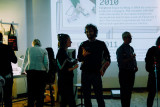
Waag is op zoek naar een Communicator (tijdelijke vervanging zwangerschapsverlof) voor de onderzoeksgroep Make. Ben jij een kei in communicatiestrategie, contentcreatie en wetenschapscommunicatie? En heb je een passie voor kunst, technologie en wetenschap?
Functie: communicator 32-40 uur (tijdelijke vervanging zwangerschapsverlof)
Afdeling: interface
Fysieke locatie: Amsterdam - Huis de Pinto
Samenvatting
Jij bent verantwoordelijk voor het ontwikkelen en uitvoeren van scherpe communicatiestrategieën met gevoel voor actualiteit, doelgroepen en creativiteit. Ook vertaal jij complex onderzoek naar behapbare en toegankelijke content die een brede doelgroep aanspreekt.
Missie
Making technology & society more open, fair and inclusive.
Waag
Waag is een culturele organisatie en stichting in het centrum van Amsterdam met ongeveer 60 medewerkers. We werken op het snijvlak van samenleving, kunst en technologie. De organisatie heeft een open werkcultuur en streeft ernaar een afspiegeling te zijn van de samenleving.
We onderzoeken urgente maatschappelijke vraagstukken en werken aan praktische oplossingen. Hiervoor werkt Waag samen met lokale, landelijke en internationale partners.
Interface
Interface, een afdeling met 10 mensen, verzorgt de communicatie over de activiteiten van Waag. Dit team vormt de schakel tussen de onderzoeksgroepen van Waag en de buitenwereld. Hiervoor werken wij nauw samen met collega’s uit onze onderzoeksgroepen.
Wil je meer weten? Check dan de volledige vacature op de website van Waag.
Solliciteren kan tot 30 mei 2021.
Summerschool ‘Ontwerp de intelligentste openbare ruimte van Zuid-Holland’
Op 7, 8 en 9 juli vieren we de zomer in Zuid-Holland! In de drukste en dichtstbevolkte provincie van Nederland onderzoeken we:
💡 Hoe kunnen technologische en/of digitale oplossingen bijdragen aan een positieve beleving van de openbare ruimte, waardoor verdichtende steden prettig en leefbaar blijven?
We zoeken jongprofessionals met kennis van de stad, sociologie en mensen met tech-skills die wilde ideeën kunnen vertalen in toffe tech-oplossingen. Wij zijn blij met omdenkers en dwarskijkers.
We organiseren deze summerschool online en we brengen een fysiek bezoek aan het Living Lab in Scheveningen om in de praktijk te leren hoe slimme toepassingen kunnen bijdragen aan de leefbaarheid van steden.
Meld je nu aan voor de summerschool ‘Ontwerp de intelligentste openbare ruimte van Zuid-Holland’ op 7, 8 en 9 juli 2021 online én in Zuid-Holland via de website https://www.kennislabvoorurbanisme.nl/project/summerschool-juli-2021/
Het Kennislab voor Urbanisme organiseert deze summerschool in opdracht van de Provincie Zuid-Holland en in samenwerking met Living Lab Scheveningen, gemeente Den Haag en Future City Foundation.
Marineterrein smart data shows our Corona curfew behavior

Wednesday was the official end of the Avondklok curfew in the Netherlands. Since 22 January 2021 the royal Dutch government issued a 9pm curfew to combat the third wave of the corona virus. The AD.nl reports that over these last 3 months, the dutch police have issued more than 95,000 fines for violating curfews.
Out of curiosity, I looked at the DrukteMeter 3 month Avondklok period to see if the Marineterrein community actually adhered to the national curfew.
The data says: yes, we did!
The table in the picture above illustrates that there are little to no people on the Marineterrein between the hours of 9 and 6am. Each night, activity on the Marineterrein stops, or flatlines just before 9pm (and 10pm as of 01 April). These insights tell us that we were all home in time and avoided curfew penalties and fines.
The Marineterrein DrukteMeter (or busyness-meter) anonymously counts the number of people in and around the innovation campus in order to keep the Marineterrein livable - especially during the Corona pandemic. This summer we’ll be using the DrukteMeter to visualize the safe and responsible transition into the New Norm and measuring the post pandemic “PULSE” of Amsterdam most popular destinations.
Amsterdam Smart City Program director on Smart Societies

Program director Leonie van den Beuken joined the SmartCom Summit a few weeks ago to share her thoughts on Smart Societies. We give you a short recap on what came up and added a few interesting insights on the biggest challenges we face working from home and some possible solutions.
Due to the pandemic, we discovered that technology can lead to new opportunities. It also raised a lot of questions on ownership of data, privacy and autonomy. Technology needs not only to be trustworthy, but also to be perceived as trustworthy. Next to that it needs to me available and accessible. Let’s make sure that everyone can have access to hardware, wifi and understandable software. So every kid can join an online class and even older people are able to understand a mobility app.
“Climate change does not wait for us to decide who is in charge”
Used well, technology is an indispensable part of creating sustainable cities. Mobility and energy transitions need the use of data. That way we can create smart grids for example. But who is in charge of creating these smart sustainable societies? ‘A pack of leaders is in charge’, Leonie says. ‘I like to compare it to the Tour de France. In different stages of the race, different cyclists take the lead. All aiming to support the star: sustainable society. And again, trust between parties is the most important thing when working together.’
Smart Communication
Covid has shown that with the support of technology we can meet anywhere online. But technology also comes with difficulties. The biggest challenges for the audience to work from home came out during a poll:
- 62% said ‘Not being around people’
- 24% said ‘Management’
- 100% said ‘Straining our Human Minds’
How can smart communication tools be of help within a company?
During the pandemic, employers manage 100 “offices” instead of one because everyone is working from home. There’s lots of technology available to monitor employees. Even though everyone agreed that trust is always better, camera’s and software to track activities on a device could stimulate and motivate.
Want to know more? Check out the talkshow.
Simple Sensors for responsible sensing

City officials require sensor data to optimize operations, plan projects, or measure effects of interventions. Citizens often do not notice the sensors deployed by the City in public space. Also, the benefit for the public is not directly obvious to city residents or immediately shown by the sensing systems in place. Namely, in many cases only after data is processed, it informs an action that affects citizens.
Public concerns about sensors are often connected to concerns about potential action (to be taken by, for example, city officials), and that the action has negative implications. With ‘Simple Sensors’ we address these concerns.
The Simple Sensors project, which is part of the Responsible Sensing Lab, investigates these questions: What if sensors are designed to be seen? What if they communicate clearly what data they collect and how? And what if sensors invite you to interact with them?
Modules for responsible and ‘simple sensing’
Simple Sensors consists of a family of modules, designed by The Incredible Machine, that can be combined: some modules improve transparency over what data is being collected, other modules encourage interaction, and some modules just make it understandable how sensors work. The Simple Sensors family allows the City of Amsterdam to design sensors to fit any context or purpose.
A privacy friendly alternative for CCTV
The first Simple Sensor prototype called millimeter wave (mmWave) has been developed as a proposal for the City’s crowd management sensor at the Marineterrein Amsterdam Living Lab. It consists of four modules: 1) sensor module 2) transmission module, 3) data module, 4) threshold module... Continue reading about the project on our website >>
Shuttercams for a responsible smart city

Shuttercam is a project by Responsible Sensing Lab (RSL), a collaboration between the City of Amsterdam and AMS Institute. In essence, RSL is a testbed for conducting research and experiments on how smart sensing technologies in public space – like cameras – can be designed in a way that makes the digital city 'responsible’.
At the Lab we invite academics and practitioners responsible for digital systems in the city to explore how to integrate social values such as autonomy, privacy and transparency in the design of these sensing systems in public space.
How to know when a camera ‘sees’ you?
The Shuttercam project originated based on the notion that citizens currently can not directly know or see if and when cameras in public space are monitoring you or not. The project also questions the necessity for many non-security related cameras in the city to be switched on indefinitely.
Experimenting with 3 prototypes at Marineterrein
The Shuttercam project will test 3 prototypes. These are installed at Marineterrein Amsterdam Living Lab (MALL) in the upcoming weeks.
First and foremost, the cameras within this project are all part of the crowd monitoring system by the City of Amsterdam, which is a privacy friendly system. So what do these cameras record or see for example?
A crowd monitoring system works with a camera that has an algorithm read out and analyzes video images. In addition to measuring crowds and displaying those crowds in usable numbers, the algorithm can also determine whether people keep a distance of 1.5 meters. All this is done in an anonymous manner that naturally complies with all privacy legislation.
The video images are not watched by a human but are processed automatically. Only a few frames are saved with unrecognizable, blurred people's faces. Those frames help to "train" the algorithm. Furthermore, the images are not saved. Continue reading about the the Shuttercam project >>
Machine Learning & Security at the Edge
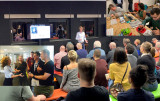
Sensemakers next meetup will focus on Machine Learning (ML) and Security at the edge. Is there a difference in running AI on the edge versus the cloud, how do you realize the same Machine Learning results for personalization of services and what are specific edge security issues? Join us here with two industry experts:
1. Renuka Nadkarni CTO of F5 as the speaker on Edge security
2. Vera Serdiukova, Sr. Product Manager AI from Salesforce on Machine Learning on the Edge
Update Intelligent Cities Challenge & Opportunities To Get Involved

The 100 Intelligent Cities Challenge (ICC) is a European Commission (EC) initiative that supports 136 cities with using cutting-edge technologies to lead the intelligent, green and socially responsible recovery. The goal is to accelerate ICC cities and their local ecosystems as engines for post-pandemic recovery, creating new jobs and strengthening citizen participation and wellbeing.
The Amsterdam Metropolitan Area, represented by Amsterdam Economic Board and Amsterdam Smart City (ASC), has joined the ICC as a mentor region. A key task for ASC is to connect and share best practices from the Amsterdam region with the ICC network.
Here are a few of the upcoming opportunities for ASC partners and community members who would like to get involved in the ICC:
- Sharing best practices during the 3rd ICC City Lab, May 18 – May 21: During this four day event, ASC partners have the opportunity to contribute to various knowledge and working sessions across a range of topics including: circular economy and Local Green Deals (LGD’s), energy efficient renovation, digitalization of government services, digital twins, and citizen participation.
- Contributing to Tech4Good Marketplace:Within the scope of ICC, the EC is developing a digital platform where cities can share their experience and recommendations for validated and deployed smart city solutions. During the April - June timeframe, ASC will collect transferable solutions and best practices from the Amsterdam Region which will be shared on the Marketplace.
- Advise on the development of the European Interoperability Framework for Smart Cities and Communities (EIF4SCC): Acknowledging the importance of interoperability for smart cities and communities, the EC contracted Deloitte and KU Leuven University to develop a proposal for a European Interoperability Framework. The aim of the EIF4SCC is to provide European local administration leaders with definitions, principles, recommendations (including practical use cases) and a common model that enables public service delivery across domains, cities, regions and borders. The first draft of the Framework is open for stakeholder consultation via the following survey until April 12.
For more information about ICC or any of the above points, please contact Cornelia Dinca, ASC International Liaison via cornelia@amsterdamsmartcity.com
Gezocht: (junior) Communicatie- en Programmamedewerker

Wil jij je inzetten voor betere straten, buurten en steden? Ben jij thuis in de wereld van communicatie, social media en community management? En heb je affiniteit met stedelijke innovatie?
Kom dan het Amsterdam Smart City team versterken! Voor ons kernteam (bestaande uit 6 mensen) zijn wij op zoek naar een:
(junior) Communicatie- en programmamedewerker
Amsterdam Smart City is een onafhankelijk innovatieplatform dat innovatieve bedrijven, kennisinstellingen, overheden en proactieve bewoners samenbrengt en vorm geeft aan de stad van de toekomst.
Wij zijn ervan overtuigd dat de veranderingen die nodig zijn voor de vooruitgang van de stad en regio alleen gerealiseerd kunnen worden door samen te werken. Al onze activiteiten zijn daarom gericht op het faciliteren van ontmoeting, interactie en samenwerking, zodat partijen samen tastbare, duurzame innovaties tot stand kunnen brengen. Amsterdam Smart City richt zich met name op deze vier thema’s: mobiliteit, de digitale stad, energie en circulaire economie. Met het Amsterdam Smart City team zorgen we voor verbinding.
Wat ga je doen?
Je voert de communicatie- en communitystrategie actief uit door het maken van content, het schrijven van nieuwsbrieven, beheren van onze social media kanalen en het organiseren van events. Je bent veel in contact met de partners en andere organisaties binnen het netwerk van ASC.
Daarnaast werk je met onze partners aan het aanjagen van innovaties binnen het transitiepad Mobiliteit & Logistiek en legt verbindingen met de community. Ook breid je het netwerk uit met relevante organisaties en innovatieve projecten. De communicatie- en programmamedewerker werkt nauw samen met het gehele smart city team en legt verantwoording af aan de communicatiemanager. Daarnaast heb je een aantal programma ondersteunende taken.
Taken
• Je beheert onze social media kanalen, geeft inzage in de statistieken en onderneemt actie op basis van de data.
• Je onderhoudt het dagelijks contact met de leden van onze community op www.amsterdamsmartcity.com
• Je verzamelt, schrijft, redigeert en publiceert content voor de community en andere stakeholders.
• Je organiseert en draagt bij aan evenementen voor partners en ons bredere netwerk in de regio en communiceert hierover.
• Je coördineert, onder begeleiding, je eigen transitiepad: Mobiliteit & Logistiek en monitort voortgang van projecten en legt verbindingen.
• Je verbindt, mobiliseert en activeert partners en communityleden
• Je voert ondersteunende programma taken uit, zoals het vormgeven van presentaties en zorgdragen voor documentatie en het bijhouden van het CRM systeem.
Profiel:
• WO/HBO werk- en denkniveau
• Opleiding op gebied van communicatie of vergelijkbaar
• 1-2 jaar werkervaring
• Goede beheersing van Nederlands en Engels in woord en schrift
• Ervaring op het gebied van online communicatie, community management en/of projectondersteuning
• Affiniteit met innovatie en stedelijke ontwikkelingen, met het thema Mobiliteit & Logistiek in het bijzonder
• Type aanpakker, zelfstandig, communicatief sterk en flexibel.
• Gedreven in het creëren van maatschappelijke waarde
Wat bieden wij?
Wij bieden je een fijne werkplek op het Marineterrein in Amsterdam, met een informele en collegiale sfeer. Op dit moment werken we uiteraard veel thuis. We zijn een klein team (6 personen) waarin we nauw met elkaar samenwerken. We werken intensief samen met een grote groep gedreven mensen die zich inzetten voor een duurzame stad en regio, voor iedereen. Het is een regionale, nationale én internationale werkomgeving waarin je eigen inbreng en pro-activiteit zeer gewaardeerd worden.
We zoeken iemand voor 32-40 uur per week. Salarisindicatie o.b.v. 40 uur: €2.900 - €3.400 bruto excl vakantiegeld en eindejaarsuitkering. Wij bieden een jaarcontract met uitzicht op een vaste aanstelling.
Interesse gewekt?
Vind je dit goed klinken? Dan horen we graag van je! Stuur je CV en een korte motivatie voor 17 april naar: info@amsterdamsmartcity.com. De eerste gesprekken zijn op 20 en 21 april. Voor meer informatie over de functie kun bellen met Menouschka Plugge via 06-43752636.
Hopelijk spreken we elkaar snel!
Hoe kan digitalisering bijdragen aan een meer duurzame samenleving?
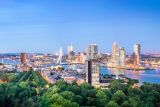
Onze leefomgeving is onlosmakelijk verbonden met de digitale wereld. Wilt u weten wat dat betekent voor meer duurzaamheid in de stad van de toekomst? Meldt u zich dan aan voor een webinar ‘Hoe kan digitalisering bijdragen aan een meer duurzame samenleving?’ op dinsdag 20 april.
Dit webinar wordt georganiseerd door de Raad voor de leefomgeving en infrastructuur (Rli), City Deal ‘Een slimme stad, zo doe je dat’ en de Future City Foundation.
Datum en tijd: 20 april, 9.30 – 10.30 uur
Locatie: Online
Deelname: Hier kunt u zich aanmelden. Deelname is gratis
Programma
9.30u Welkom en introductie
9.40u Pieter Hooimeijer over het advies van de Rli
9.50u Jan-Willem Wesselink over de City deal en hoe je een slimme stad bestuurt
10.00u Workshop over maatschappelijke veranderingen door digitalisering
10.15u In gesprek: wat is de rol van digitalisering in de duurzaamheidstransitie?
10.30u Afsluiting
In dit advies aan de overheid pleit de Rli ervoor om meer aandacht te hebben voor de veranderingen die digitalisering teweeg brengt in onze fysieke leefomgeving. In haar digitaliseringsbeleid moet de overheid duurzaamheid nadrukkelijker meenemen. Andersom moet het potentieel van digitale technologie beter worden benut voor de duurzaamheidstransities.
In de City deal worden concrete digitale en technologische tools ontwikkeld voor de slimme stad van de toekomst. Daarmee sluit de City deal aan bij het advies van de Rli aan de overheid voor een nieuwe denkwijze over digitalisering.
Sprekers
Prof. dr. Pieter Hooimeijer is voormalig lid van de Rli en voorzitter van de Rli-commissie die het advies voorbereidde. Hij zal de kern van het advies van de Rli toelichten. Jan-Willem Wesselink is hoofdredacteur van het boek ‘Zo bestuur je een slimme stad’ en programma manager van de City Deal ‘Een slimme stad, zo doe je dat’ en de Future City Foundation.
Stay up to date
Get notified about new updates, opportunities or events that match your interests.

